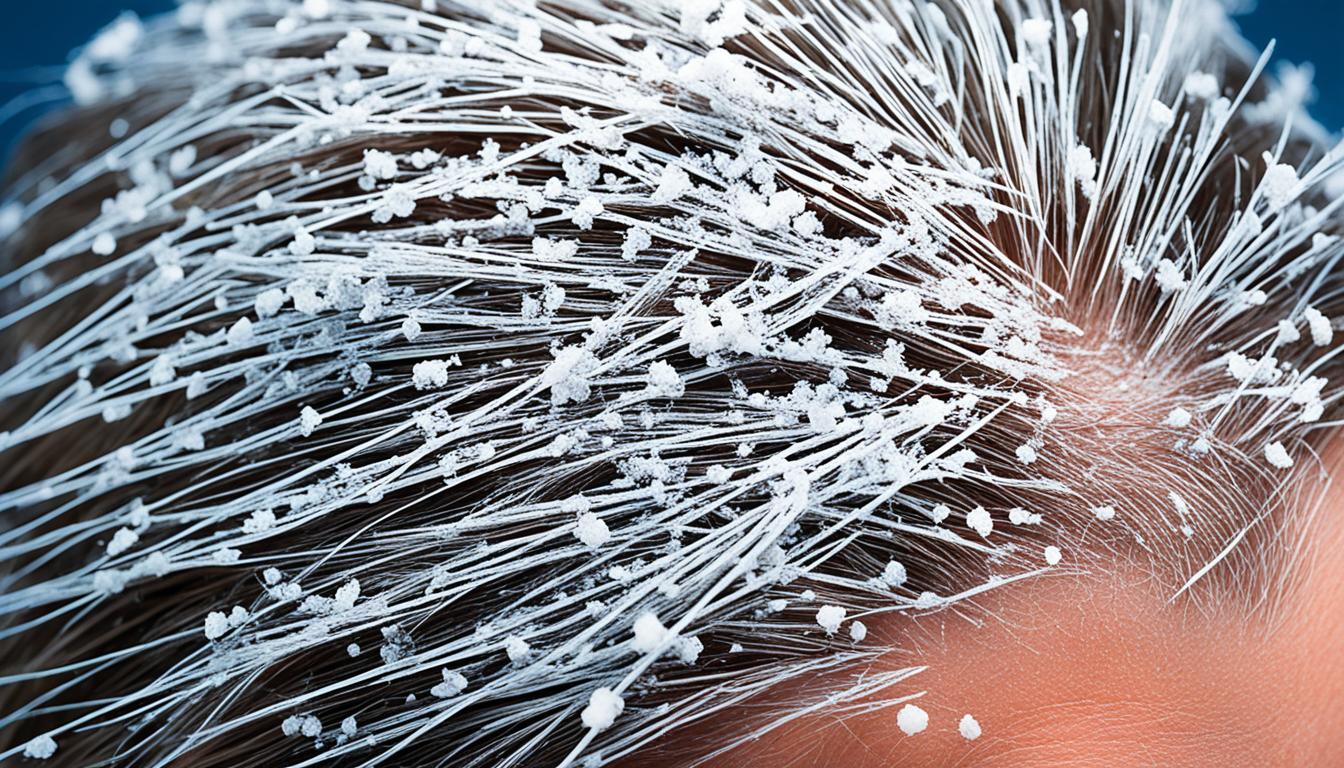Dandruff is a common scalp issue that many people face. It often shows up between the ages of 20 and 30. You notice it by a flaky scalp and constant itching. The cause of dandruff isn’t completely clear. But, dry weather and not keeping your scalp clean are big factors.
Dry weather can make your scalp lose moisture, leading to flakes. Pollution is another issue. It can make your scalp itchy and dandruff worse. Not washing your hair often can also cause dandruff. This allows oils and dead skin to build up.
Some have a sensitive scalp, making them prone to dandruff. Conditions like seborrheic dermatitis, psoriasis, or eczema can have similar symptoms.
You can manage and treat dandruff well, which is great news. Using anti-dandruff shampoos with ingredients like zinc pyrithione helps. Other treatments include coal tar, ketoconazole, or selenium sulfide shampoos. Lifestyle changes are important too. Eating well and drinking more water can help. Stem cell therapy is an option for severe dandruff cases. But, we need more research on how effective it is.
Key Takeaways:
- Dandruff is a common scalp condition characterized by flaking and itching.
- It can occur at any age, but it’s most prevalent between 20 and 30.
- Dandruff is caused by factors such as dry weather, environmental pollution, infrequent shampooing, and a sensitive scalp.
- It can also be a symptom of seborrheic dermatitis, psoriasis, or eczema.
- Treating dandruff involves regular shampooing with anti-dandruff shampoos and making certain lifestyle changes.
- Stem cell therapy may be an option for severe cases, but more research is needed.
Causes and Favorable Factors for Dandruff Development
Dandruff is a common issue that causes itching and flaking on the scalp. It comes from different causes and certain things can make it more likely to happen.
Too much scalp stimulation is a leading cause of dandruff. This can be from scratchy hands or the use of rough hair products. Dry air and pollution also play a part.
Not washing your hair enough can lead to dandruff. If the scalp isn’t cleaned, oil, dead skin, and dirt build up. This can cause flakes and itchiness.
People with sensitive skin may get dandruff easier. Their scalps react more to things, causing more flakes and discomfort.
Dandruff might signal other scalp issues like seborrheic dermatitis or eczema. These can disturb the scalp’s balance, making dandruff more likely.
Few things can make dandruff more likely to show up. It often affects men more than women. This may be due to different hormones and oil production.
A bad diet lacking in scalp-healthy nutrients can make dandruff worse. Not getting the right nutrients weakens the scalp’s defenses against dandruff.
People with oily skin face a higher risk of dandruff. Too much scalp oil helps a fungus called Malassezia grow. This fungus causes dandruff.
Neurological issues or weakened immune systems can also lead to dandruff. These problems affect the scalp’s ability to keep itself healthy.
In short, the causes of dandruff include too much scalp stimulation and specific environmental factors. Things like diet, skin type, and health conditions can also boost dandruff risk.
Treatment Options for Dandruff
Mild dandruff is easy to manage with anti-dandruff shampoos. These shampoos use ingredients like zinc pyrithione or ketoconazole. They help control dandruff effectively when used regularly.
For a more severe situation, using specialized shampoos is important. A dermatologist or hair care expert can recommend the best product. They will match the right shampoo to your scalp’s specific needs.
Finding the best treatment might need some trial and error. Different shampoos work for different people. So, trying several options and seeing what works is a good idea.
Stem cell therapy is a new, promising way to deal with serious dandruff. It aims to fix the scalp’s issues from the inside out. Yet, we need more studies to prove how well it works and if it’s safe.
Eating well and drinking enough water can also help. A diet full of vitamins and minerals supports a healthy scalp. Plus, drinking water keeps the scalp hydrated and free from dryness. These changes, along with dandruff treatments, improve scalp health.
FAQ
Q: What is dandruff?
A: Dandruff is when your scalp flakes and feels itchy. Many people get it, especially between 20 and 30.
Q: What are the causes of dandruff?
A: Dry weather, pollution, and not washing your hair enough can lead to dandruff. It might also show up with skin conditions like seborrheic dermatitis or psoriasis.
Q: How can dandruff be treated?
A: To treat dandruff, use special shampoos with ingredients like zinc pyrithione. For tougher cases, you might need shampoos made just for dandruff. Sometimes, stem cell therapy could help.
Q: What factors increase the risk of developing dandruff?
A: Dandruff is more common in men and can happen if your skin is oily. It might show up if you have problems with your nerves or immune system.
Q: Can diet and lifestyle changes help reduce dandruff?
A: Eating well and drinking lots of water can improve dandruff. But, always talk to a doctor for the best advice.
Q: Is stem cell therapy a potential treatment for dandruff?
A: In very serious dandruff cases, stem cell therapy might be an option. But, we still need more research to know if it’s really safe and effective.

